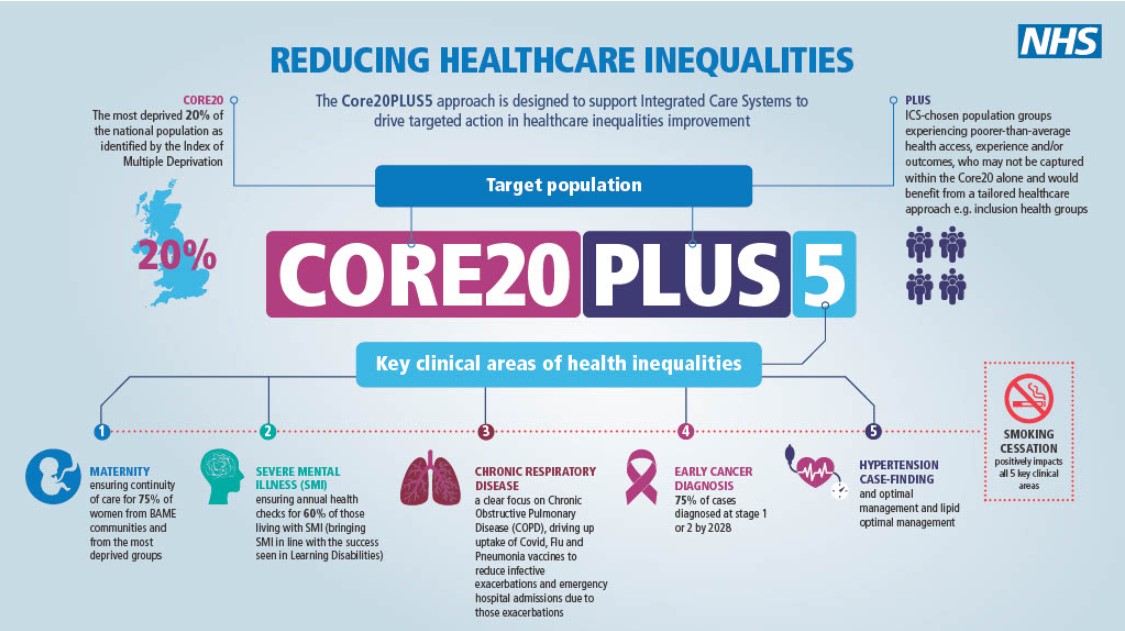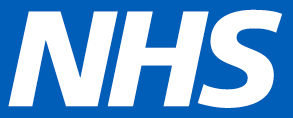
Sharing best practice, inspirational content and working examples in order to support health and care systems address current challenges and needs.
Reporting on health inequalities to NHS Trust boards
NHS England (NHSE) and ICBs have both statutory obligations and strategic imperatives to contribute to the reduction in health inequalities among the population.
A key strategic priority, ensuring the inclusive recovery of NHS services, sets out the need to improve board-level reporting on health inequalities.
NHSE asked for ICBs and Trusts to:
A key strategic priority, ensuring the inclusive recovery of NHS services, sets out the need to improve board-level reporting on health inequalities.
NHSE asked for ICBs and Trusts to:
- Use their data to plan the inclusive restoration of services, guided by local evidence
- Publish board papers that include an analysis of waiting times disaggregated by ethnicity and deprivation
- Demonstrate how the ICS’s senior responsible officer (SRO) for health inequalities will work with the board and partner organisations to use local population data to identify the needs of communities experiencing inequalities in access, experience and outcomes
- Improve data collection and reporting will drive a better understanding of local health inequalities in access to, experience of and outcomes from healthcare services

NHSE commissioned us to produce a deep dive into board performance through a series of case studies with the aim of understanding the data challenges further, assessing whether trusts and systems feel they are currently reporting to a high standard, and identifying solutions that have been put in place.
Download the summary report (PDF)Case studies
With support from the Provider Public Health Network, we conducted a series of interviews with eight Trusts from a range of different provider types – Acute, Community, and Ambulance.
Mid and South Essex NHS Trust has worked with its local partners to develop a digital tool to ensure Equality Health Impact Assessments (EHIAs) are completed in a more timely and accurate manner.
The tool is set to go live in October 2023, with testing completed in July 2023 showing its implementation will result in a number of quality improvements.
This includes:
- driving forward compliance among staff with the EHIA process
- increasing the proportion of EHIAs being actioned and impacts understood
- increasing the robustness of reporting to provide reassurance to Boards that health inequalities are being appropriately considered in change plans.
Learnings
1
Trusts have used data to inform their decision-making and this has provided valuable insight as well as a fresh focus on health inequalities.
2
There is a lot of useful learning as organisations develop their thinking which provides a good opportunity for sharing information and building relationships or collaborations.
3
People are motivated to make real change and aren’t interested in going through the motions of tick-box exercises. They want practical, useful tools to help them take practical action to address health inequalities.
Overall, the eight case studies demonstrate that trusts are using a diverse range of approaches to report on the progress and impact of improvements in addressing health inequalities. It should be recognised the case studies are at various levels of maturity in the implementation of their approaches.
Further resources
- NHS Providers resources on health inequalities
- NHS England‘s suite of inequalities-related case studies
- Complementary work on inclusive elective care recovery carried out by The Strategy Unit
- Provider Public Health Network: For any membership or other enquiries, please complete this form. The Provider Public Health Network is an independent forum, supported by the NHS England national Public Health Team.
- NHS England - Making data count
Using data
- Tackling health inequalities with effective data and insight (NHS Providers)
- The Healthcare Inequalities Improvement Dashboard (NHS England)
- OHID Acute Trust Catchment Populations Microsoft Power BI Dashboard

Core20PLUS Connectors
Exceptional quality healthcare for all through equitable access, excellent experience, and optimal outcomes is the NHS's goal for reducing healthcare inequalities.
...


